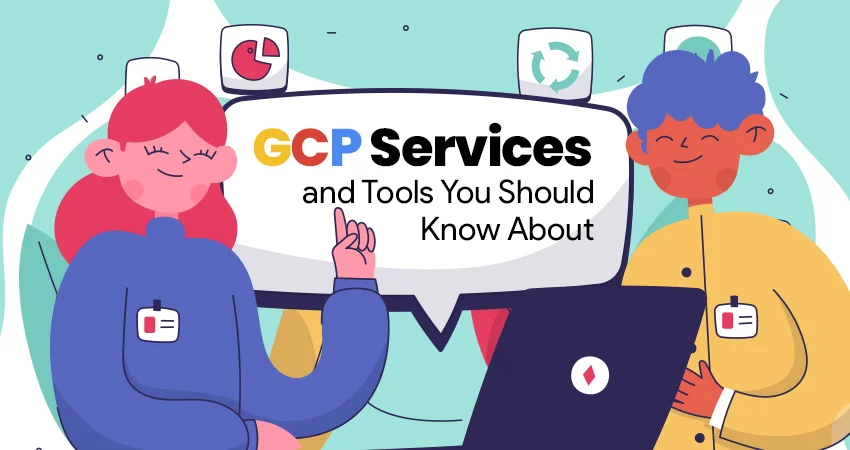GCP Services and Tools You Should Know About

Cloud Service Architecture is now the number one method of Server architecture and there have been several providers that have come forward as the industry leaders in Cloud Services. Google (GCP), Microsoft (Azure), Amazon (AWS) have become the industry leaders by far.
For this Blog we take a look at services provided by GCP. Services like Compute Engine,Google Kubernetes Engine (GKE), BigQuery, and Cloud Storage, Cloud SQL are offered by GCP which are generally essential services for a project. However, beneath the surface lies a suite of lesser-known yet powerful services that can significantly enhance your cloud strategy. Whether you're a developer, data scientist, or IT professional, understanding these hidden gems can help you unlock new possibilities, streamline operations, and optimize costs.
Shout out to the Devops Team on some of the suggestions to include in this. 🙌
- Recommendation Hub
The Google Cloud Recommendation Hub is a tool within Google Cloud that helps users optimize their cloud environment by providing personalized, actionable recommendations. These recommendations are generated based on usage patterns, security configurations, cost analysis, and other factors that can help in improving performance, reducing costs, and enhancing security.
GCP Docs - Recommendation Hub

- Policy Intelligence
The Policy Analyzer tool aids in understanding and troubleshooting IAM (Identity and Access Management) policies by providing a detailed analysis of resource access and identifying potential security risks, such as overly permissive roles. The Policy Simulator allows you to simulate the impact of changes to IAM policies before applying them, preventing accidental access disruptions or security vulnerabilities.
The Policy Troubleshooter helps identify reasons for unexpected access denials by simulating access requests and pinpointing the policies or permissions causing the issue. Lastly, the IAM Recommender offers suggestions for refining IAM policies, such as removing unused permissions or replacing broad roles with more specific ones, ensuring adherence to the principle of least privilege.

GCP Documentation - Policy Intelligence
- Security Posture
GCP Docs: SCC | Security Posture
Managing vulnerabilities is an essential part of maintaining security and compliance. Google Kubernetes Engine (GKE) releases security bulletins when vulnerabilities that could impact clusters are identified. The GKE Security Posture dashboard displays these bulletins, alerting you to issues relevant to your clusters based on their version and configuration.
The security bulletin surfacing feature allows GKE to automatically assess whether an incident affects your environment and provides actionable mitigations. This helps alleviate the workload for your security team by streamlining the process of handling numerous active CVEs.

- Google Cloud BCDR
Business Continuity and Disaster Recovery (BCDR) on Google Cloud Platform (GCP) involves using GCP tools and services to maintain application and data availability in case of disruptions. Key practices include:
- Google Cloud Storage (GCS): Provides reliable, scalable object storage with various classes and features like versioning and cross-region replication to ensure data durability and availability.
- Cloud SQL and Cloud Spanner: Offer managed relational databases with automated backups, replication, and failover. Cloud Spanner is ideal for applications needing high availability and horizontal scaling.
- Google Kubernetes Engine (GKE): Supports containerized applications with multi-zone and regional clusters for high availability and disaster recovery.
- Compute Engine: Facilitates recovery with persistent disks, snapshots, and custom images, and enhances availability with managed instance groups, auto-scaling, and load balancing.>
- BigQuery: Provides high availability and built-in replication for large-scale data warehousing.
- Cloud Load Balancing: Distributes traffic across instances and regions for fault tolerance.
- Cloud Monitoring and Logging: Tracks performance and detects issues to aid in incident response and recovery.
- Disaster Recovery Planning: Develops and tests recovery plans regularly using GCP’s infrastructure for backups, failover, and testing.
- Service Level Agreements (SLAs): Ensure GCP’s SLAs meet your availability and recovery needs.
- IAM and Security: Controls access with IAM, and protects data with encryption and security measures.
GCP Documentation - GCP BCDR

- Cloud Finops
Cloud FinOps Hub is a specialized platform designed to enhance Cloud Financial Operations (FinOps). It offers a suite of tools and resources for managing and optimizing cloud expenditures. Key features include cost management dashboards that allow organizations to monitor and analyze their cloud spending, identify cost drivers, and track budget adherence. The hub also provides optimization recommendations to help reduce costs and improve resource efficiency. Governance and compliance tools ensure that cloud spending aligns with organizational policies and regulatory requirements.
Additionally, it offers comprehensive reporting and analytics to provide insights into cloud expenditures, enabling informed decision-making. Collaboration features and training resources are available to help teams effectively implement FinOps practices. Integration with major cloud platforms like AWS, Azure, and Google Cloud ensures seamless data gathering and analysis.
GCP Documentation - Cloud Finops

- Query Insights
Google Cloud Platform (GCP) Query Insights is a powerful tool designed to monitor and optimize SQL queries on Google Cloud SQL and BigQuery. It provides comprehensive performance metrics, such as execution time, row processing, and query frequency, helping users identify slow or problematic queries and understand their impact on database resources. The tool offers detailed query analysis, including execution plans and optimization recommendations, to improve query performance. Users can also access historical performance data to track trends and set custom alerts for performance thresholds. Integration with other GCP services, such as Cloud Monitoring and Logging, enhances its functionality by providing a holistic view of database performance. Query Insights is valuable for performance tuning, cost management, and troubleshooting, enabling users to optimize their database operations and manage resource usage more effectively.
GCP Documentation - Query Insights

In an ever-evolving cloud landscape, staying ahead of the curve means exploring beyond the most commonly discussed services. Google Cloud Platform offers a diverse array of tools that cater to various needs—from optimizing your data management to enhancing your application development processes. These are just a few of the hidden gems within GCP. By integrating these lesser-known yet highly effective services into your workflow, you can unlock new levels of efficiency, scalability, and innovation.